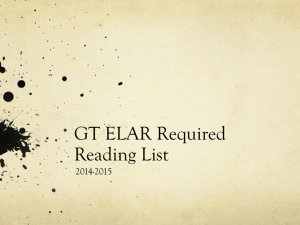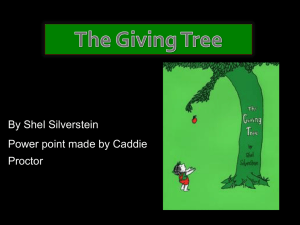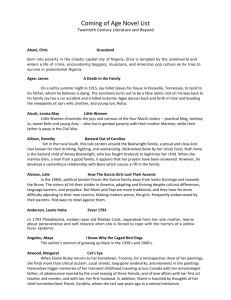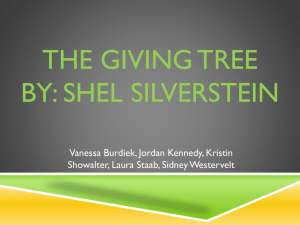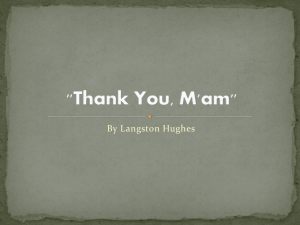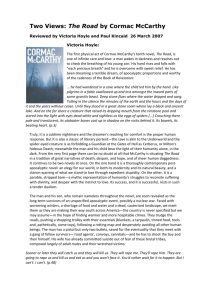book review
advertisement
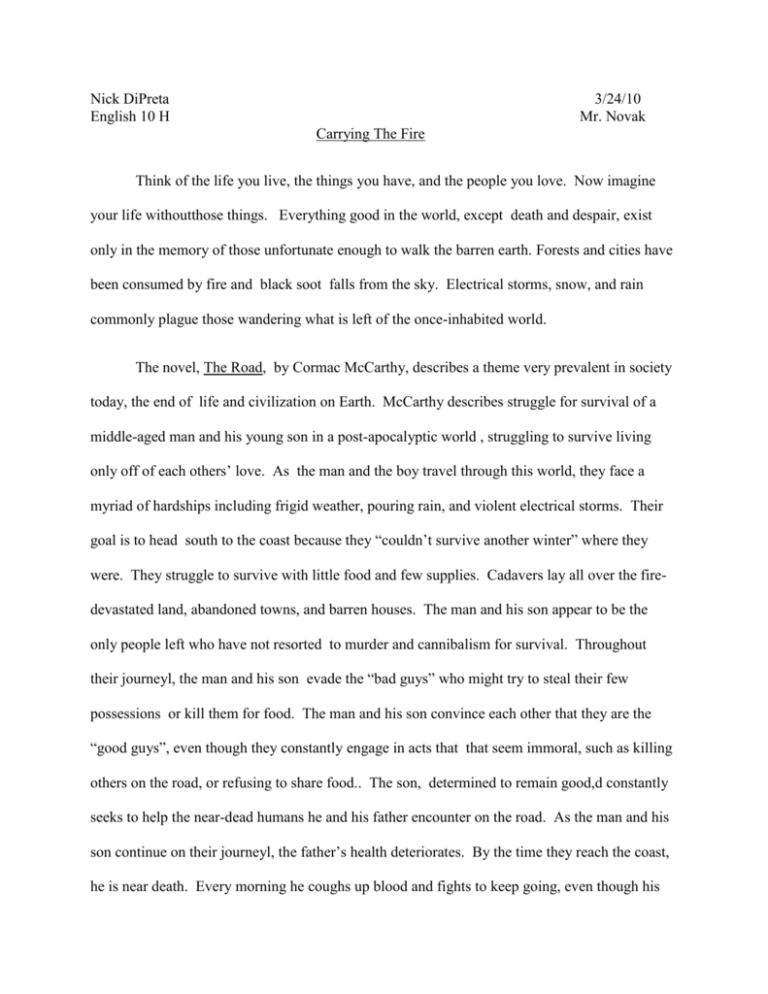
Nick DiPreta English 10 H 3/24/10 Mr. Novak Carrying The Fire Think of the life you live, the things you have, and the people you love. Now imagine your life withoutthose things. Everything good in the world, except death and despair, exist only in the memory of those unfortunate enough to walk the barren earth. Forests and cities have been consumed by fire and black soot falls from the sky. Electrical storms, snow, and rain commonly plague those wandering what is left of the once-inhabited world. The novel, The Road, by Cormac McCarthy, describes a theme very prevalent in society today, the end of life and civilization on Earth. McCarthy describes struggle for survival of a middle-aged man and his young son in a post-apocalyptic world , struggling to survive living only off of each others’ love. As the man and the boy travel through this world, they face a myriad of hardships including frigid weather, pouring rain, and violent electrical storms. Their goal is to head south to the coast because they “couldn’t survive another winter” where they were. They struggle to survive with little food and few supplies. Cadavers lay all over the firedevastated land, abandoned towns, and barren houses. The man and his son appear to be the only people left who have not resorted to murder and cannibalism for survival. Throughout their journeyl, the man and his son evade the “bad guys” who might try to steal their few possessions or kill them for food. The man and his son convince each other that they are the “good guys”, even though they constantly engage in acts that that seem immoral, such as killing others on the road, or refusing to share food.. The son, determined to remain good,d constantly seeks to help the near-dead humans he and his father encounter on the road. As the man and his son continue on their journeyl, the father’s health deteriorates. By the time they reach the coast, he is near death. Every morning he coughs up blood and fights to keep going, even though his pace slows. He eeventually e dies in the woods one night with his son. The boy cries at his death, but his father’s final words have inspired him to continue on and to “carry the fire” of the good people. Soon, a man with a shotgun approaches the boy, and convinces him to join his family. The boy leaves his father, and continues to live in his father’s name with a new family. Death is one of several major themes in The Road. The relentlessly harsh environment and constant threats from cannibalistic murderers represent death.. Plants and animals have been wiped out by the unnamed disaster that destroyed civilization."On the hillsides old crops dead and flattened. The barren ridgeline trees raw and black in the rain" (page18). When the man has a flashback of his life before the catastrophe, he sees considers this to be a sign of his impending death. The relationship between father and son represents the theme of paternal love. Before the man’s suicide, “all that stood between him and death” (page 25) was the boy. The man only lives for his son. When asked the father was asked by his son what he would do if he died, the father replied “Then I would want to die too.” (Page 11). The man sees suicide as a way out in case of imminent death. He believes in fighting to live, no matter how terrible the conditions. The father consistently shows the strength of his bond with his son in his quick decisions to eliminate all who pose a threat to the boy.. The man also gives his son any good things he can find, such as the can of Coca-Cola he finds in an abandoned supermarket. The man’s religious faith is an important aspect of the novel. When a man he meets appears surprised tosee the boy, , the father replies “What if he is a God?” The man also exclaims at one point that if his son was not the “Word of God”, then God never spoke. Several times throughout the novel, the man and his son refer to each other as “carrying the fire”, that is the fire of hope and individual perseverance. At the end of the novel, the boy carries on the fire. The stark simplicity of the language of The Road.is almost lyrical. The amount of detail in the novel makes it elegant . The absence of an explanation about where the characters are, what cataclysm occurred, or even the time period it happened in, compels the reader to draw their own conclusions. The reader may f question the absence of names of the characters, the landscape details, and even assume what exactly happened to the world. It is inspirational that even in the face of despair, after reaching the coast to no avail, the the novel is hopeful, as the son finds a new family to continue with him on his journey.. The Road’s simplicity and beauty in style were the novel’s greatest strengths, whereas its weaknesses lied in the lack of character development. Beyond understanding the depth of the love between the father and the son, the character know little about them or their situation other than that the mother committed suicide because she had lost all hope. This small weakness doesn’t detract from the compelling plot and great imagery. I would recommend The Road to anyone. However, this book is not for the faint of heart. Horrifying s. McCormick uses vivid and harrowing details that truly immerse the reader in the world. The Road is a bleak portrayal of an apocalyptic future where little is left of civilization beyond the bond between a father and a son and the hope that human kindness survives.
